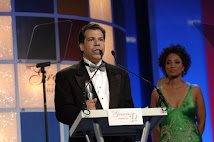We've kidded about this within our building for years. Apparently everyone in the world who is in radio wants to be syndicated. There's nothing wrong with that really. Everyone should have their aspirations.
That's how I got into the business. I was a sophomore in college and some friends and I thought that everyone should hear the top 10 New Wave songs of the week. Two years and 80 stations later we thought we were geniuses. Then we lost our sponsors and had to fold the company--at the ripe old age of 21!
It wasn't till much later on that we realized in our particular case that the reason for our success was not our concept, but lack of product within our target market (we played a lot of imported music which was not easily obtained by college stations outside of big cities). As more of the product became available domestically, I think our show would have had less and less appeal.
Which brings me to the point of this blog and some thoughts about syndication:
Successful syndication requires that you provide something to a station that it can't do or can't easily do on it's own: Jingles, show prep, and even personalities fall into this category. Many people can talk politics, but clearly Rush Limbaugh and to a lesser degree Glenn Beck and Sean Hannity make it entertaining as well. Limbaugh is the master. Right or left, you have to appreciate the craft and how well he entertains.
The hottest show today is probably Ryan Seacrest's radio venture. It's a double whammy because you get a national star plus you get the celebrity interviews that would be difficult if not impossible for stations to do on their own. If you're not Seacrest, you still have a shot, but you have to ask yourself the hard question: What is it that I do that a station can't do themselves just as easily.
Someone brought me a sample of a show they want to syndicate that is essentially a history of Classic Rock. Would stations want that? Possibly. But upon listening to the show, the person hosting it was a poor announcer, and he didn't bring anything new to the music than the information that was readily available on the Internet. If he had some interviews, or some little known information about the artist or if he shuffled up the music thematically in some way, the project might have had some appeal. As it was the project had neither production values, nor good information, nor anything different musically.
Another person asked me about being syndicated. He was doing an Urban PM Drive show. He said his show was just like Michael Baisden's very successful show. I asked him what he does and he said he plays music and takes calls. That alone isn't what makes Michael's show unique. It's his position on society and his sometime controversial positions regarding Civil Rights and African Americans that put him on the map and his daily radio show keeps people listening because it's a compelling show. This individual had really no idea about what his own show was about and worse than that, his ratings in his home market were very poor.
That's the other part of the equation. If you're going to syndicate, you had better be a big star in your home market first. Look at any of the "entertainment" based shows in AM or PM Drive and they have that one thing in common: Dominance of their home market. Bob & Tom, Bob & Sheri, Tom Joyner (who did a show live each day in BOTH Dallas and Chicago for a while) share this trait. Some debate whether success in a single market is a guarantee of success elsewhere, and I'll talk about that in a subsequent post.
Bottom line: Can everyone be syndicated? Maybe. Depends on your abiltiy to bring something to stations that they can't duplicate easily or a ratings track record that demands attention.
Wednesday, September 10, 2008
Subscribe to:
Comments (Atom)




